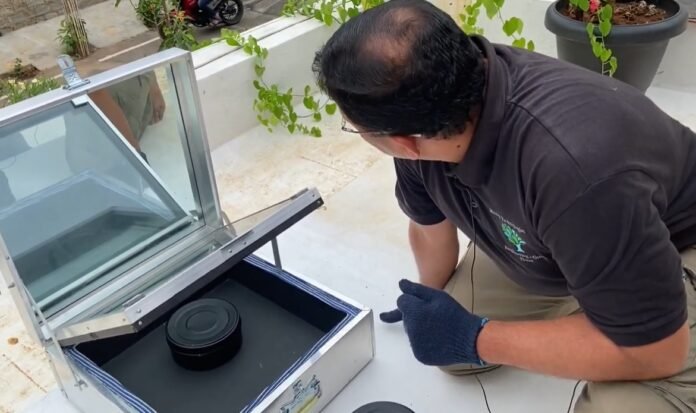Introduction
Sun thermal collectors include solar cookers. The thermal energy (heat) from the Sun is “gathered” and trapped. Low-frequency infrared radiation is created when high-frequency light is transformed into it. UV and visible light can readily flow through glass, but when they collide with a dark surface, they become long-wave infrared radiation (heat). The glass captures long waves.
Working of Solar Cooker
Fuel
The fuel is the sun. A solar cooker requires a location outside where the food will be safe, have many hours of direct sunlight, and be sheltered from severe winds. Solar cookers are not functional at night or on overcast days.
Convert sunlight to heat energy
Light surfaces don’t heat up as much in the sunshine as dark surfaces. To keep heat and moisture in, cooking is best done in shallow, thin metal pots that are dark and have dark, tight-fitting lids. Glass tops for pans can be used with an effective cooker to prevent opening pots from checking on the food.
Retain Heat
The black pot is surrounded by a transparent heat trap that allows light to enter but traps heat. These can be an insulated box with a glass or plastic window, a huge inverted glass bowl, or a transparent, heat-resistant plastic bag.
Benefits of Solar Cooker
Since there is no cost for using solar energy, a solar cooker is economical.
A solar oven produces no pollution.
There is little risk of damage, and the solar cooker is straightforward to operate.
Food’s nutrients are not destroyed or lost.
Uses of Solar Cooker
Disinfecting Unclean Water
Solar cooker plays a crucial role in areas with limited access to clean water and diseases brought on by badly cleaned medical equipment. Chemical disinfectants like iodine are in short supply, and the fuel required to boil water is costly. For heating water in such locations, solar ovens offer a cheap and readily accessible alternative to wood and fuel.
Metal and carbon nanoparticles dispersed in an aqueous solution are used in a solar cooker, which harnesses solar energy to produce steam. The water vaporizes even on chilly days to generate a steam bath that sterilizes devices in about 30 minutes because these particles absorb heat extremely fast and transfer it to the water.
Cleaning Air
The fact that wood fires produce hazardous fumes and dust particles into the air, which humans must breathe, is one of the major issues with using wood and petroleum to heat water. This is particularly risky if the home where the fire is occurring has a subpar chimney and limited ventilation, which is common in rural locations.
Solar cookers are used to clean the air since they are entirely clean and do away with this issue, but they are only a practical option in nations with suitable dry and sunny climates. Cooking procedures must be arranged to take advantage of the sunlight while out because they don’t operate in overcast or dark conditions. That can need changing one’s dietary habits.
Cooking Food
Sun box cookers are solar ovens and may be used to cook or bake since the food can be prepared inside a sealed box. Solar cooking utilizes the sun’s UV radiation.
It is safer to eat food that has been heated to a temperature high enough to destroy disease-causing microorganisms. The benefit of a solar cooker is that it can provide the heat necessary for accomplishing this without using any fuel other than sunlight, which is essential in areas where wood and petroleum are scarce.
Other Uses of Solar Cookers
- Using a solar cooker only needs a small amount of water to cook your food.
- After evaporating, the water is recovered as fresh water. The sun’s UV rays purify the water, breaking down microbes’ DNA bonds. Water is distilled as a result.
- Solar-powered iron ore smelting is a clean process since it doesn’t release too much carbon dioxide into the environment.
- We may dehydrate the veggies and other food products in the solar cooker or oven.
- A straightforward solar oven is a solar wax melter. We set the raw wax on a screen that is part of it. It drops into the container below as it slowly melts.
Recommended Articles:
Uses of Transistor
Uses of Zener Diode
Ultraviolet Lights
Value of g on the Moon
Value Of Plancks Constant
When cooked in solar ovens, it gently cooks and does not burn, retaining its moisture and nutrients. Many groups are promoting solar cooking to the world's less developed regions to stop additional deforestation in fuel-short places. A solar cooker is a device that uses the energy of direct sunlight to cook food, often using reflecting panels to direct the light onto a dark-colored pot inside an insulated box. It works slowly Around the world, people use solar cookers to prepare food and pasteurize water, so it is safe to drink. They do not harm the environment because they utilize a free, renewable energy source. When other fuel sources are not accessible or when using fossil fuels should be avoided, solar cookers are very helpful. Solar thermal energy, often known as direct solar power, is the energy produced when solar energy is transformed into heat. Solar cooking uses solar thermal energy to cook food instead of electricity. In other words, you may use a solar oven wherever there is a lot of sunlight. Uses Of Solar Cooker FAQs
Why is cooking meals in a solar cooker preferable?
What is a solar cooker?
What are the disadvantages of the solar cooker?
It cannot be utilized on days that are cloudy or wet.
Not all types of food can be prepared with a solar cooker.
It is not applicable everywhere on the globe.What is the significance of solar cookers?
What type of energy does a solar cooker use?
